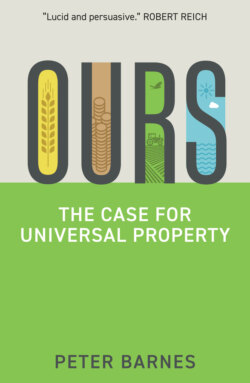Читать книгу Ours - Peter Barnes - Страница 8
Author’s Note
ОглавлениеKeep your eyes on the stars but your feet on the ground.
Theodore Roosevelt
Over the decades I’ve studied our economy from inside and out. As a journalist, I often wrote about it from the outside. Later, I co-founded businesses that probed the limits of capitalism from within. One was a worker-owned cooperative that installed solar heating systems in the 1970s. Another was a socially screened money-market fund called Working Assets, and a third was a progressive phone company called Credo Mobile.
In all these ventures, profit was a goal but not my primary one. My primary goal was to see whether, and by how much, businesses could shift, in a positive way, the behavior of our larger economy. Could they model good corporate behaviour that would then be emulated? Could they challenge the dominant algorithm of corporations, maximize return to shareholders? Could they non-trivially alter the flow of money through our economy?
Sadly, after twenty years, my conclusion was that, while socially minded companies can do good things, they can’t change our economy by much; they are swimming against a tide that is too strong. What we need is not a few companies voluntarily behaving slightly better, but a system that makes all companies behave a lot better, whether intentionally or not. But how, very practically, could such a system be designed and installed?
More broadly, the need to repair or replace capitalism is now indisputable. This is not just because of the financial meltdown of 2008 or the Covid collapse of 2020. It is first and foremost because of markets’ built-in systemic flaws – ever-widening inequality and disruption of nature. Those trajectories cannot continue. They must be turned in their opposite directions – toward greater equality and alignment with nature. But again, the practical question is how.
Ruminating on these questions, I came to the realization that something important is missing from markets. Modern humans are heirs to a vast trove of naturally and socially created wealth. This wealth legitimately belongs to all of us together and equally. It also comes with a duty to be preserved, if not enhanced, for future generations. The problem – and it’s a huge one – is that this co-inherited cornucopia is simultaneously ignored, stolen, and destroyed by markets as structured today.
This is more than an intellectual failure; it is a real-world failure with vast social and planetary consequences. But the point of this book is that it can be fixed. If, through property rights, we recognize co-inherited wealth as assets to be preserved and beneficially owned by all persons equally, we could transform markets, societies, and our planet simultaneously. Instead of destroying nature, markets would protect it; instead of widening inequality, markets would reduce it. Yes, markets would do those things. And that would change everything.
With this realization in mind, I began putting together a mental model of an economy that retains the dynamism and efficiency of markets, but adds a new kind of property rights for large chunks of our co-inherited wealth. In this model, we would each inherit equal non-transferable shares of that co-inherited wealth and surrender them when we die. We would also co-inherit a legal obligation, administered by trustees, to preserve our joint inheritances for future generations. What I came to see was that this kind of property regime could, at scale, make markets work for everyone, including nature and future generations.
Let me make four quick points before you read on. First, the book will invite you to think differently about our economy than you probably have before. So be willing to take off your old economic glasses and put on a new pair.
Second, I’ve written the book for informed general readers, not experts. For that reason, I often skimp on details in order to keep the main argument clear. If you want more depth on a particular topic, the endnotes and bibliography can lead you to it.
Third, although the ideas expressed in this book can apply to all modern economies, they are a product of my experience in the United States, and are perhaps more applicable in Anglophone countries than elsewhere.
And finally, though I began writing this book long before the Covid pandemic, the ideas expressed here are even more pertinent now than ever.
Peter Barnes
Point Reyes Station, California
